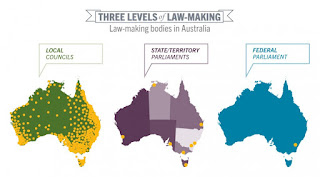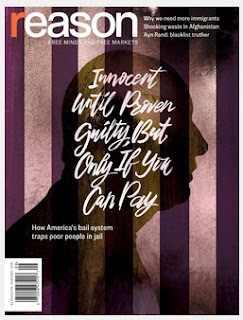If this new action by the Australian Government was to be
described as a law (you know an 'Act') it could be called something like;
An Act for more cost effective administration of the serf
population monitoring control of movements and other purposes within the
colony of Australia.
If you are not given a choice you no longer live in a
democracy but rather a dictatorship, totalitarian state, corpratocracy, fascist
regime or another system of governance you care to name.
This is case for people who are 'owned' by the government,
the ones who are on 'benefits' i.e. the elderly, the unemployed, or the sick,
the people who went over the seas to kill people for the benefit of the people within
the Australian Government.
Make no mistake about it the serfs who are owned by the
government will be catalogued like cattle and treated as such, by those who
assumed office.
The surveillance (police) state is very mature in the
colony, where this latest move will be subject to data breaches in the future,
where 'your' data will be breached and not 'theirs'.
Never forget who the people in government regard as their
primary enemy:
See article from 2 July 2018 by news.com.au of the headline:
Welfare recipients to undergo face scan in order to get payments
UNDER divisive new regulation, welfare recipients may soon have to have
their faces scanned and analysed in order to access their payments.
A NEW controversial system may soon see welfare
recipients required to have their face scanned and analysed before they
can access their payments.
Under the new strategy those trying to access these government services will be required to take photo to create a myGov ID, which will then be checked against driver’s licences and passports to confirm their identity.
Human Services Minister Michael Keenan has hopes the plan will see Australia become a world leader in “digital government” by 2025.
When fully rolled out the digital identity solution will allow users access to almost any government agency through one single portal, with the trial allowing 100,000 people to apply for a Tax File number online.
Currently applicants have to fill in a form online, print it out and take it to the post office so their identification can be verified.
But the introduction of the new system is causing some concern over the privacy of those taking part.
IT security expert Troy Hunt, who runs the website haveibeenpwned.com, told news.com.au that a biometric system — like the one proposed — wasn’t without its faults.
“One of the problems is we want to be able to access things in a secure fashion but passwords aren’t really great for doing that because a lot of us tend to use the same one for everything,” he said.
“Biometrics can be better in this aspect but on the flip side it is information that can’t really be changed if there is a security breach.”
Mr Hunt said that once a database is built up of this biometric data then there was the possibility it could be used for reasons other than it’s intended purpose. For example having a scan of people’s faces on file could make it easier to identify or track people through security camera.
There are some security concerns with the new biometric system. Picture: Tracey Nearmy/AAPSource:AAP
“What we want to see from the Australian government is transparency about how this system is being used and where the information is going,” Mr Hunt said.
“They need to convince us that we can be confident in this system and trust them [with] this kind of data.”
The new system will be implemented on a voluntary basis but those who refuse to take part won’t be able to access government services online.
This means they will have to queue up at Centrelink to access these services in person.
For those who do use the new system they have been assured that their digital face image will be deleted as soon as it is checked against the other identifying documents they provided.
A media release published on Mr Keenan’s website states that “privacy and security will be at the heart of any of the changes we plan to make”.
“Consultation will also be vital with both industry and relevant interest groups to ensure we deliver services that people will want to use and also trust,” the statement reads.



















